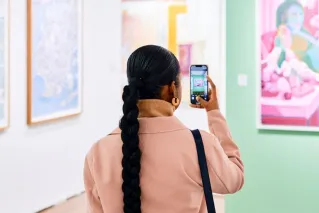The agony (not the ecstasy) behind the screen biz
A new survey launched by Griffith University will explore the dark side of working in the film and television industry – in the hope of making things better for all


Filmmaker and academic Associate Professor Peter Hegedus is leading a Griffith University survey into mental health in the screen industry.
The film and television business worlds are glitzy and glamourous, aren’t they?
Well, maybe around Emmys and Oscars time, but making content for the big and small screen is hard graft and comes at a cost to mental health.
With that in mind, a ground-breaking survey has been launched by Griffith University researchers to assess the state of mental health in workers across an industry that is booming at the university and across Queensland.
Filmmaker and academic Associate Professor Peter Hegedus is known for his passionate exploration of human stories, so it was only a matter of time before he reflected on his community.
Hegedus says people working in such an inherently competitive industry are often trying to make films with very small budgets, which adds to the stress.
“Working around the clock, not sleeping or working 12-hour days has become embedded in our industry culture as being normal, but it’s not OK,” Hegedus says.
“People have been suffering silently, so we thought, what if we create a comprehensive survey that could be released into the industry and ask some strong questions about where people are at and how they’re feeling?
“We’re not sure what the solution to the problem will be, but having the facts is going to help us work towards one.”
Some of the facts already known are quite shocking. About 83 per cent of screen directors think the overall pressures and stressors of working in the industry contribute to poor mental health outcomes and one in three screen directors know a colleague who has taken their life.
Meanwhile, 44 per cent of industry workers have moderate to severe anxiety, which is 10 times higher than the general population.
About 35 per cent of all Australian entertainment industry workers earn an annual industry income below $20,000 and 44 per cent of entertainment industry workers don’t get enough sleep.
The industry was rocked by Covid-19 lockdowns, when production largely halted across the country and the world, leaving a strong feeling of isolation in the screen industry and community.
“Filmmaking is about collaboration through connection and I noticed people had stopped connecting with one another,” Hegedus says.
“This separation propelled me to set up the Screen Collective with local filmmaker friends Bobbi-Lea Dionysius, Andrew McInally and Tam Sainsbury, which brought filmmakers in Queensland together, mostly via Zoom, to alleviate some of the isolation many were feeling.
“It gave people a space to share thoughts and reach out to one another, but also led to discussion around some key issues concerning the industry.
“It was around this time that we came to the realisation that many of us were feeling quite challenged in the mental health space and perhaps had been for some time. After talking to some service providers, we realised there really wasn’t a mechanism in place from agencies or guilds to look after people’s wellbeing on set, and behind the scenes.”
Struggling to find data on mental health and wellbeing in the screen industry, Hegedus found film crews in the independent screen sector were facing difficulty advocating for improved conditions or support without any real evidence.
Collaborating with fellow Screen Collective founder and Griffith Film School sessional teacher Bobbi-Lea Dionysius to research and look at overseas examples, the pair then teamed up with Professor Paula Brough from Griffith’s Centre for Work, Organisation and Wellbeing to develop their plan after uncovering shocking statistics supporting the idea that a survey would be valuable.
With support from industry guilds and representatives, the survey will be circulated extensively throughout the industry. Associate Professor Hegedus says the findings of this comprehensive survey will be used as “a benchmark to compare our current findings, as well as include the impact of Covid-19”.
“Via our survey, we will also be forging new research into the important yet under-represented communities that make up our screen industry, including the impact of gender, diversity and inclusion, as well as regionality of screen practitioners in Australia and its impact on their career, mental health and well-being,” he says. “We anticipate issues to arise such as workplace bullying, harassment, social isolation, reduced team coherence and exclusion to job opportunities.
“Lastly, students who are embarking on their career in the screen industry will also form part of the survey and uncover new research in the education sector, as it has been observed among film schools that students in the creative industries and, more pointedly, in the screen studies, have noted an increase in anxiety and depression compared to non-creative vocational studies.”
Founder of Screen Well, Ben Steel, supports the survey. His organisation works to promote and improve mental health outcomes for the Australian screen industry.
“Capturing screen industry specific statistics on mental health and wellbeing is an incredibly valuable tool to understand the complexities that students and industry professionals face in pursuing their careers,” Steel says.
“Having a deeper and better understanding of the challenges will enable Screen Well to enhance the effectiveness of the programs and initiatives we provide to the industry.”
The Australian Screen Industry Mental Health and Wellbeing Survey targets all sectors of Australia’s screen industry as well as actors and is now open. Click on the link below to start the survey.
This article is republished from InReview under a Creative Commons licence. Read the original article.
InReview is an open access, non-profit arts and culture journalism project. Readers can support our work with a donation. Subscribe to InReview’s free weekly newsletter here.![]()












